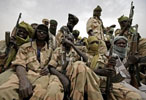
After a two-month hiatus for the Sudan elections, peace talks aimed at resolving the seven-year crisis in Darfur resumed this weekend – but with some conspicuous absences and against a backdrop of ongoing clashes between the Sudanese government forces and rebels in Darfur.
Representatives from the Liberation and Justice Movement, or LJM, led by Tijani Seise, returned to the negotiations with the Sudanese government on Sunday. (Enough published two updates from the first round of Doha talks, which provide details about key actors and allegiances. Read them here and here.) But the rebel groups that wield the significant military strength refuse to participate in the talks, hampering the extent to which meaningful progress can be made.
Most notably, the Justice and Equality Movement, or JEM, has refused to rejoin the talks, though it was a breakthrough between the Sudanese government and JEM that initially got the Darfur peace talks off the ground in February. At that time, JEM and the government signed a framework agreement that set the parameters for negotiations, but the ceasefire was promptly violated.
Heavy fighting between the Sudan Armed Forces and JEM has continued in the Jebel Moon region of Darfur, with government forces rolling out heavy artillery for the first time since the conflict started in 2003. The Sudanese army also heavily bombed Jebel Marra, the stronghold of the rebel group led Abdel Wahid, known as SLA-Abdel Wahid. Both rebel groups claim that the government is bullying them into negotiations and have refused to participate.
The heightened and ongoing violence in Darfur is, of course, a significant consideration as talks resume in Doha. According to a confidential U.N. document, 440 people were killed in fighting between the government forces and rebels last month, making May the deadliest month in Darfur since 2008. (Additionally, 126 people died in tribal violence and 31 in other forms of violence, including murder.) The uptick in fighting has also forced as many as 100,000 people to flee their homes in Jebel Marra in recent months; displacement figures in other parts of Darfur are difficult to come by because the U.N. peacekeeping mission is unable to travel freely to make assessments.
Despite the blatant effort of the Sudanese government to quash the rebel groups militarily, President Omar al-Bashir declared before the opening of the latest round of talks, “The current Doha round will be the last for any armed group and there will be no legitimacy through the gun, only through the ballot box.”
Without the participation of these significant rebel groups and with token civil society leaders only participating in the Darfur peace talks as observers, Enough policy advisor Omer Ismail expressed limited optimism about what the process might accomplish. “With the absence of major rebel groups and influential Darfuris from this round of talks, it will be hard to reach any meaningful agreement that will end the conflict in Dafur,” Ismail said. “In fact, if things continue on the current track, the outcome of these talks will be far less than Abuja."
Enough will follow the developments in Doha closely, so please check back for frequent updates.

